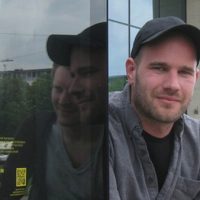
By Heidi Simmons
The Palm Springs International Short Film Festival & Film Market attracts the best short films the world has to offer. A major part of the festival is to celebrate rising talent and promote student films. This year’s ShortFest included four winners of the 41st Student Academy Awards competition.
The 2014 Academy Winning films are:
“Owned” by Daniel Clark and Wesley Tippetts — Brigham Young University, Utah , Clark and Tippets won the Animation – Gold Medal. The six minute animated film is about a video game master who gets schooled by a toddler and discovers the true meaning of life.
“Nocebo” by Lennart Ruff — University of Television and Film, Munich. Ruff won Foreign – Gold Medal. A psychological thriller, “Nocebo” traces the plight of a young man, Christian, who escaped a medical facility for schizophrenia and is now desperate to save his lover, Anna in the same clinic.
“White Earth” by J. Christian Jensen — Stanford University. Jensen won Documentary – Silver Medal. “White Earth” explores the emptiness of North Dakota coming to an end with the recent boom of oil jobs and the arrival of people looking for a better life for their children.
“Door God” by Yulin Liu — New York University. Lui won Narrative – Silver Medal. The film is about a little girl on Chinese New Year who learns reality is not what it seems as she discovers how betrayal can be done out of love. (Lui did not respond to questions.)
Following are questions and answers from four of the five award-winning filmmakers:
CVW: What was the idea behind your film?
Filmmaker Daniel Clark: The idea for our short film “Owned” came from the life of my co-director, Wesley Tippetts. So I’ll let him answer that one for you.
Filmmaker Wesley Tippetts: “Owned” is about the fighting game champion of the world whose life is changed when he faces his most challenging opponent ever — a tiny baby.
Fimmaker Lennart Ruff: I was interested in the nature of reality — what is real, what is not. At the end of the movie, it doesn’t matter if Anna exists because Christian’s feelings are real. The “Nocebo” effect, Christian’s Schizophrenia, are just variations of transmitting this idea to the screen.
Fimlmmaker J. Christian Jensen: The idea behind White Earth was to create an intimate visual portrait of an American oil Boom through voices and perspectives that are usually overlooked. In my case I focused on children and an immigrant mother. It’s really about the American Dream.
CVW: What was the first movie you saw?
CLARK: No idea, but I remember seeing “The Nightmare Before Christmas” when I was really young and I loved that movie. It’s something I go back to constantly for inspiration. I think I was drawn to the fact that there were no rules that had to be followed in that world — someone’s head could get chopped off and they would keep on singing. Animation has the luxury of not having any real-world limitations. You can have unicorns barfing rainbows right next to the President and that’s okay. That’s animation.
TIPPETTS: I honestly can’t remember. It was probably a Disney movie…or maybe “Ferngully?” Yeah, I think it was “Ferngully.”
RUFF: The first encounter with cinema had a big impact: It was “Beethoven.“ I was together with my parents and my sister and we were forcing our parents to get a puppy.
JENSEN: I’ve been told my mother watched “Return of the Jedi” while I was in the womb, which might explain my obsession with the trilogy. But I think my first memory of watching a movie as a child was “Bambi.” That part where his mother dies still haunts me.
CVW: What inspired you to study filmmaking?
CLARK: When I was in 1st grade, we went on a field trip to an Imax theater and saw a making of “Star Wars” documentary. I couldn’t believe people got paid to play with toys — not to mention blow them up. That was when I knew that’s what I wanted to do with my life.
TIPPETTS: I love art and design, and I’m greatly influenced by film and video games. They inspire me. My goal was to use my art skills to create films or videogames that continue to inspire, entertain and bring people together.
RUFF: I wanted to reach and touch people, like I was touched by movies.
JENSEN: I came from a background in journalism, but found a creative outlet in things like theatre, band, and “Dungeons & Dragons.” While severely reducing my attractiveness to the opposite sex, those creative activities found a nice marriage in the art of documentary filmmaking.
CVW: What is your favorite movie?
CLARK: Tie between “The Fountain” by Darren Aronofsky and “Doubt” by John Patrick Shanley.
TIPPETTS: My favorite animated film is “The Incredibles.” I love pretty much everything about it. It has a wonderful story that entertains but reaches deeper. The characters are believable and appealing. The action sequences are top notch. All in all, just a wonderfully entertaining film.
RUFF: Oh there are way too many. At the Moment in the hot desert sun, lying around a pool I have to think a lot about: “The Graduate.”
JENSEN: Impossible question. The “Star Wars Trilogy,” “Iraq in Fragments,” Werner Herzog’s crazy early films like “Fitzcarraldo,” almost everything Terrence Malick has ever made.
CVW: Why do movies matter?
CLARK: They don’t matter. Not really. People matter. And stories that can help people matter. Sometimes a movie can show a story that can help someone. When that happens, that’s pretty cool.
TIPPETTS: Films matter because they are not just a means to tell stories, but they unlock our imaginations and portray things that don’t exist. In a world of stress, sadness and disappointment, we need to be able to dream.
RUFF: I think there is no other communication form witch comes with so many layers and so much power. If it’s used in a right way, it can change people’s mind.
JENSEN: They don’t. But people matter, relationships matter, the way we treat ourselves and each other matters. If the movies you make have a net positive effect on any of these things, then keep doing them. If not, get a real job.
CVW: What are you working on now?
CLARK: Got a few ideas in development, can’t talk about any of them. I’m interning with a software company called Side FX in Santa Monica. After that, hopefully working on the upcoming “Star Wars” projects could be in my future.
TIPPETTS: I’m currently finishing my last semester at Brigham Young University. My goal is to go the studio route as quickly as possible after I graduate. I’m working hard to make it happen.
RUFF: I am working on several feature projects at the moment. They’re all situated in the thriller genre.
JENSEN: I’m editing a documentary feature called “Out Run” about the world’s first LGBT political party. It’s an observational campaign drama following a motley crew of transgender and gay activists who are trying to navigate the messy world of Filipino elections.
CVW: If money was not an issue and you had complete control, what movie would you make?
CLARK: I would adapt K.A. Applegate’s book series “Animorphs” into a movie franchise. It would be awesome.
TIPPETTS: This is a tricky question because I have SO many ideas floating around in my head. I suppose first off, I would like to see a feature-length animated version of Calamity Jane. It’s a great movie and I love the music. It would make a wonderful animated film. Otherwise, I’d like to direct my own Superman movie. Looks like Zach Snyder already beat me to it, but who knows what the future will hold!
RUFF: Well, there is this sailing story. Lots of water. Lots of VFX. Lots of boats crashing! All this funny stuff which gives producers headaches. But it is a thrilling story about human bravery and I am thinking about it since 7 years now.
JENSEN: I’d probably try and do something big and existential. Like a non-fiction trilogy exploring death or some wacky big budget psychological sci-fi doc-fiction hybrid.
Clearly, these are names to remember. There is little doubt they will all be forces in the global film community.




















































